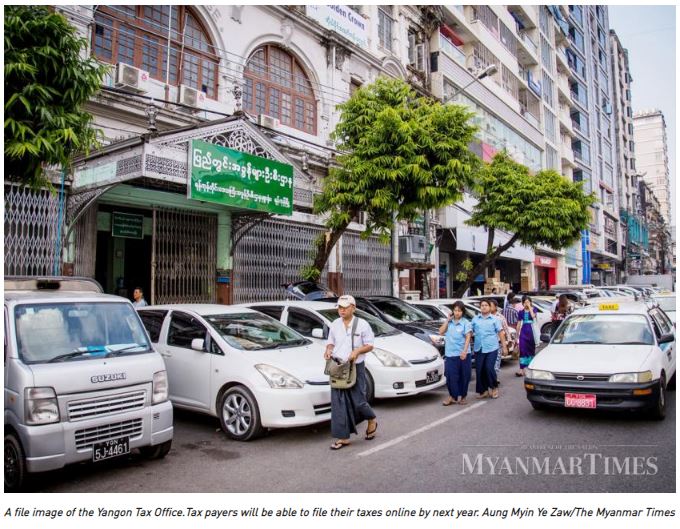Myanmar: Govt deploys strategy to raise tax revenues
Myanmar will implement plans to raise tax revenues in the coming years. “Our target is collect over 15 percent in taxes to GDP,” said U Min Htut, director general of the Internal Revenue Department under the Ministry of Planning and Finance.
The tax to GDP ratios of other ASEAN countries are all above 10pc, with Thailand topping the list at 17pc. The most Myanmar has ever achieved in terms of tax collection is just around 10pc of GDP in 2014-15. Since then, the country’s tax take has averaged 7pc-8pc of GDP, according to official data.
Notably, tax revenues have been falling short of government estimates of late. For the interim period between April and September, tax revenues totaled K1.9 trillion as of August, compared to the forecast of K2.9 trillion for the period before.
In 2018-19, the government expects to receive an estimated K7.6 trillion in tax revenues compared to K7.1 trillion in 2017-18.
Wider base
U Zaya Thu, a political and economic analyst, said Myanmar should widen its tax base to meet the needs of the country, particularly in education and healthcare, in the years ahead.
“The Myanmar taxation system only focuses on those who are traditionally asked to pay taxes such as personal taxes and business taxes. The types of taxes need to be expanded so that the Internal Revenue Board (IRD) can reach as many people as it can. At the same time, we need to build up a tax-paying culture by giving incentives to encourage people to pay taxes.”
There are currently 21 types of taxes in Myanmar. Between 2011 and 2015, Parliament approved changes to the income tax and commercial tax laws. In 2016, it approved the special commodities tax law.
Meanwhile, the Tax Management Bill is being debated in Parliament and it is expected to be approved in November. “After this is approved, we will submit a new Income Tax Bill which has already been finalised,” said U Min Htut.
The government is also seeking more control over real estate monopolies and speculation on land prices. “A new bill for supervising property taxation is in the works and a draft has already been completed,” Deputy Minister U Maung Maung Win told parliament.
E-system
This year, the tax collection system will be changed from the current paper-based system to a digital system.
By switching to an electronic system, taxpayers can pay their taxes directly to the government, which is expected to encourage tax compliance and raise revenues, as taxes can now be paid much more conveniently, and reduce corruption.
“Now, the one thing left is to sign an agreement to buy the Integrated Tax Administration System software, which will be provided by Canada’s Sogema Technologies Inc,” said U Min Htut.
The IRD, which collects 80pc of the nation’s taxes, will obtain IT support after the agreement is signed this year, after which it will take another year to ready the new tax system.
The new software will incorporate a system of self-assessment, under which taxpayers will compute their own taxes unlike before, when taxes payable were calculated by the IRD.
“We’re working to improve our services and tax collection system. If taxpayers do no not abide by the new system, legal action will be taken,” said U Min Htut.
“There will be fines for late tax payments and failure to register. But the aim of the new system is to enhance the government’s tax revenues and not to punish tax evaders,” he added.
Source: https://www.mmtimes.com/news/govt-deploys-strategy-raise-tax-revenues.html


 Thailand
Thailand




